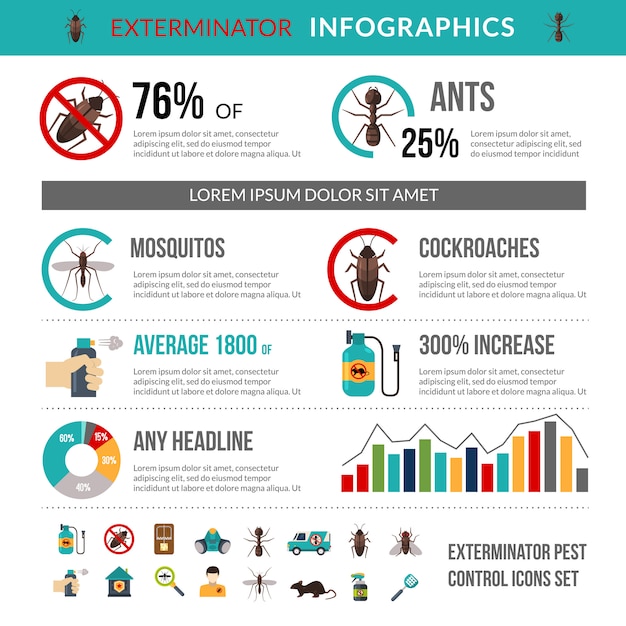The Secrets Of Parasite Control Pros! Let Loose The Power Of Innovative Methods And Bid Farewell To Pesky Bugs For Good
The Secrets Of Parasite Control Pros! Let Loose The Power Of Innovative Methods And Bid Farewell To Pesky Bugs For Good
Blog Article
Material Develop By-Vazquez Kincaid
Are you tired of depending only on sprays to take care of parasites in your home or work environment? While sprays can be effective, pest control specialists have actually created innovative techniques that go beyond just splashing chemicals.
These methods not only give more efficient and long-lasting options, yet likewise focus on decreasing the use of damaging chemicals. By discovering these advanced methods, you will certainly uncover a whole brand-new globe of insect control techniques that are not only effective, however additionally environmentally friendly.
So, are you ready to take your pest control video game to the following degree?
Integrated Insect Administration (IPM)
If you're trying to find an efficient and environmentally-friendly approach to pest control, Integrated Pest Management (IPM) is the solution you need. IPM focuses on long-lasting prevention and management of insects, rather than merely relying on pesticides. This strategy thinks about the certain demands and behaviors of insects, in addition to the surrounding environment.
By utilizing a combination of methods such as biological control, environment manipulation, and targeted chemical usage, IPM aims to decrease the reliance on chemical treatments and decrease injury to non-target organisms.
One crucial aspect of IPM is checking and determining insects accurately. https://www.bobvila.com/articles/wildlife-removal-cost/ involves consistently checking and examining the pest population, in addition to recognizing the specific types existing. By understanding the biology and actions of pests, pest control specialists can create targeted methods to interrupt their life cycle and decrease their numbers.
An additional essential aspect of IPM is utilizing non-chemical control approaches whenever possible. This can consist of physical barriers, such as setting up screens or sealing fractures and holes, to stop insects from getting in structures. Additionally, social practices, like appropriate sanitation and waste management, can assist get rid of insect food sources and reproducing premises.
When pesticides are needed, IPM focuses on using them carefully and as a last resource. This means picking the least hazardous and most reliable choice, applying it specifically and just to impacted areas, and adhering to all security guidelines. By decreasing pesticide use, IPM minimizes the prospective risks to human health and the atmosphere.
Biological Control
To further boost the performance of Integrated Bug Monitoring (IPM), the next subtopic we'll discover is the approach of organic control. This strategy uses natural predators or bloodsuckers to control bugs.
Below are four vital facets of organic control:.
1. Intro of natural opponents: In this method, beneficial insects or organisms are presented to the location plagued with pests. see this site -natural opponents take advantage of the bugs, helping to decrease their population.
2. Conservation of all-natural adversaries: Rather than introducing new microorganisms, this approach concentrates on producing an appropriate atmosphere for existing valuable insects. This can be achieved through giving food, shelter, and water sources.
3. kill big black ants : Below, the number of natural enemies is raised synthetically by reproducing and launching them right into the infested location. This assists to rapidly lower the pest population.
4. Push-pull technique: This method incorporates repellents and attractants to control the actions of insects. Repellents push bugs away from plants, while attractants lure them in the direction of trap crops or areas where they can be easily regulated.
Environment Alteration
Habitat adjustment plays a critical role in parasite control by modifying the setting to prevent parasite invasions. By making changes to the physical features of a space, you can create an unwelcoming atmosphere for parasites, making it harder for them to survive and flourish.
One usual approach of habitat modification is getting rid of or reducing possible food resources for parasites. This can consist of appropriate waste management, securing containers, and cleaning up food crumbs.
In addition, eliminating or minimizing areas of standing water can aid regulate parasites like mosquitoes.
Altering the landscape by cutting trees and hedges far from buildings can additionally prevent bugs from accessing your residential or commercial property.
Conclusion.
So there you have it - the sophisticated methods made use of by insect control specialists surpass simply spraying chemicals. Integrated Insect Monitoring (IPM) incorporates numerous approaches to properly manage bugs, while organic control utilizes all-natural enemies to keep bug populations in check.
Habitat adjustment also plays a critical function in stopping parasite problems.
Did you know that according to a research study, executing IPM strategies lowered pesticide use by approximately 71%? This not just secures our wellness and the atmosphere but also saves money in the future.
